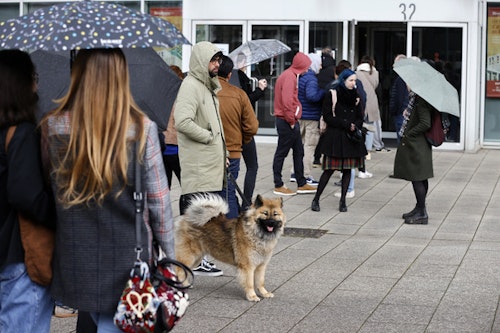French President Emmanuel Macron came first in France's presidential election with 27.6% and far-right leader Marine Le Pen came second with 23.4%, according to interior ministry figures.
French voters took to the polls on Sunday in what was turned out to be a three-horse race for the presidential run-off among the 12 candidates.
This first round of the highly anticipated contest for leadership of Europe's second-largest economy saw President Emmanuel Macron and far-right leader Marine Le Pen make it to the run-off on 24 April.
A quarter of registered French voters did not turn out. The abstention rate of around 25% was nearly three percentage points higher than in the last election in 2017.

 ${title}
${title}
Live ended
Key points on the first round of France's presidential election:
- French President Emmanuel Macron and far-right leader Marine Le Pen have qualified for the runoff of France's presidential election.
- With 97% of electors' votes counted on Monday morning, official figures put Macron on 27.6% of the vote, and Le Pen on 23.41%.
- Several candidates have called on their supporters to vote against the far-right in the runoff election on 24 April including Yannick Jadot, Anne Hidalgo, and Valérie Pécresse.
- Far-left leader Jean-Luc Mélenchon came in third in the first round of the election, his score of 21.95% within two points of 2nd placed Marine Le Pen. All other candidates won under 10%.
France's traditional left and right parties have 'collapsed almost completely', an expert told Euronews of the election results. Both the Socialists and Republicans received under 5% of the vote, which means they will have to pay for their campaign costs.
The abstention rate of 25.14% was high for a presidential election but not a record.
Here are six takeaways from the first round of France's presidential election.
- How does the election system work? Here's a look at how the vote works.
- The French president is afforded more powers than other European presidents. Here's a rundown of how the Fifth Republic works.
- From inflation and the war in Ukraine to COVID-19 and the environment, there are a lot of topics that have played a role in the first round of this election.
That's the end of our live coverage this evening. Follow our coverage throughout the week on Euronews.com.
Six takeaways from the first round of France's presidential election
The first round of France's presidential election took place on Sunday with a high abstention rate and some of the same faces as the contest that took place five years ago.
President Emmanuel Macron remains the favourite to win the race but faces a tough challenge from far-right leader Marine Le Pen.
Here are the election results based on 96% of votes counted
- Emmanuel Macron --- 27.41%
- Marine Le Pen --- 24.03%
- Jean-Luc Melenchon --- 21.57%
- Eric Zemmour --- 6.97%
- Valérie Pécresse --- 4.75%
- Yannick Jadot --- 4.49%
- Jean Lassalle --- 3.25%
- Fabien Roussel --- 2.33%
- Nicolas Dupon-Aignan --- 2.12%
- Anne Hidalgo --- 1.74%
- Philippe Poutou --- 0.78%
- Nathalie Arthaud --- 0.58%
Greens ask for money after failing to achieve 5% threshold for campaign reimbursement
"The future of ecology is in peril. By making less than 5% in the first round of the presidential election, environmentalists will not be reimbursed for the costs incurred," the party said.
"This is very bad news for the planet because it puts the party of those who defend it in great difficulty. The fight for ecology is however more urgent than ever."
"To continue the fight that drives them, environmentalists must raise 2 million euros by May 15, 2022. Ecology needs you. Donate."
Samuel Grzybowski, who organised the 'Popular Primary', calls on left-wing parties to form a parliamentary union
Grzybowski said if the Socialists, Greens, Communists and France Unbowed parties "sign a deal tonight and form a #ParliamentaryUnion, they can have a (non-absolute) assembly majority by winning in 250 constituencies and change the course of history for the planet and for us."
Here are the election results based on 92% of votes counted
- Emmanuel Macron --- 27.4%
- Marine Le Pen --- 24.37%
- Jean-Luc Melenchon --- 21.18%
- Eric Zemmour --- 6.94%
- Valérie Pécresse --- 4.76%
- Yannick Jadot --- 4.44%
- Jean Lassalle --- 3.29%
- Fabien Roussel --- 2.35%
- Anne Hidalgo --- 1.73%
- Philippe Poutou --- 0.78%
- Nathalie Arthaud --- 0.58%
A breakdown of France's election results by town
Final results are coming in from France's interior ministry by town. Here's a breakdown on a map.
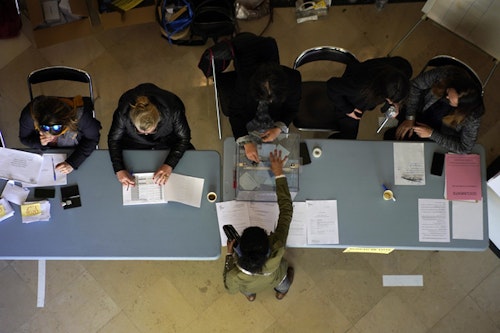
French election: Brussels favours Macron in second round of voting, says expert
Emmanuel Macron is the candidate of choice in the French presidential election for Brussels, according to one expert.
Eric Maurice from the Robert Schuman Foundation told Euronews that the French elections are being followed closely by the EU, where there's a clear awareness of what's at stake for the 27 member bloc.
“For the EU, the second round will ultimately be for continuity with Macron and a pro-European stance. So we can imagine that he is the preferred choice from the point of view of European partners and European institutions," Maurice said.
'I want a France that is part of a strong Europe,' says Emmanuel Macron
Emmanuel Macron says he is the candidate for a "strong Europe" ahead of a presidential election run-off against Marine Le Pen.
"I want a France that is part of a strong Europe, that continues to forge alliances with the major democracies to defend itself," he said at his election night headquarters.
Read the full story here.
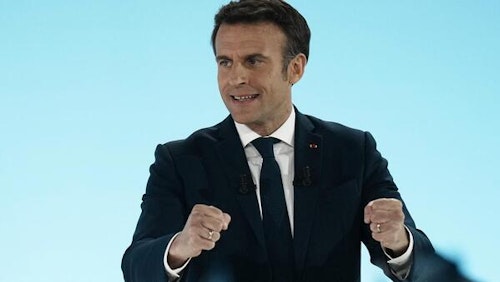
High abstention rate in first round of the election
The abstention rate in the first round of France's election was at around 26 to 28.3%, according to pollster estimates.
It's a high rate for a presidential election which typically has better participation than other elections. The record highest abstention rate in a first round of a presidential election was in 2002 at 28.4%.
Poll says Emmanuel Macron would win in second round against Marine Le Pen, but not by much
Incumbent President Emmanuel Macron would win in the second round against Marine Le Pen 51% to 49%, according to a poll carried out by the Ifop-fiducial institute for TF1 / LCI / ParisMatch / SudRadio.
The poll predicts a much closer race for Macron compared to the 2017 race where he won the election against Marine Le Pen 66.1% to 33.9%.
Two dominant parties in France have 'collapsed almost completely,' expert tells Euronews
The two dominant political parties in France, the Socialists and the Republicans, have "collapsed almost completely at the national level," said Douglas Webber, an emeritus professor of political sciences at INSEAD.
"As national political forces and presidential and parliamentary elections, they're at their weakest ever," he added.
He said this indicated that there was a new political line in France that was not right and left but more a "cosmopolitan, liberal, internationalist" camp on Emmanuel Macron's side and an "insular, conservative nationalist" camp with Marine Le Pen.
"French voters are going to be posed with a very fundamental choice between these two directions," he said.
'We have the choice between two enemies', says Workers' Struggle candidate Nathalie Arthaud
Far-left candidate Nathalie Arthaud said the second round of the presidential election was the choice between "two enemies" denouncing both Emmanuel Macron and Marine Le Pen.
She said that on 24 April she would vote "blank".
Socialist Party, Republicans, Communists and Greens below 5% mark, with survival at stake, expert says
The results for the two traditional French parties on the right and left as well as for the Greens are financially "catastrophic", Sciences Po Lyon professor Paul Bacot told Euronews.
"The legislative elections look bad for them," he added, with their "material survival at stake".
'We can choose France and Europe together,' says President Emmanuel Macron after coming first in the first round of the presidential election
French President Emmanuel Macron called everyone to vote for him to "block the far-right" saying that he understood that some would vote for him in the runoff even though they do not support him.
Macron called for people to transcend their differences to come together in his political movement.
"In this decisive moment for the future of the nation, nothing should be as before. This is why I wish to reach out to all those who want to work for France," he said.
Macron added that the election was not yet won but that his project was the choice of both France and Europe.
President Emmanuel Macron is speaking. Watch his speech with English translation live.
Communist candidate Fabien Roussel warns the far-right is at the gates of power
"Our country is facing a terrible situation: the far right is at the gates of power, and the candidate president has a great responsibility in this situation," he said.
"Macron must give up on senseless reforms: he must withdraw his plan to extend retirement," Roussel tweeted.
Two weeks to keep Putin’s allies away from the Elysée, says MEP Guy Verhofstadt
Belgian MEP Guy Verhofstadt said the real battle has only begun in the French elections.
"2 weeks to keep Putin’s allies away from the Elysée," he said, referring to Marine Le Pen. "2 weeks to strengthen liberté, égalité, fraternité  against authoritarianism and hatred!"
against authoritarianism and hatred!"
Greens candidate Yannick Jadot calls on supporters to vote for Macron to 'stop the far-right'
Matteo Salvini, former Italian interior minister, congratulates French far-right leader Le Pen
Former Italian interior minister Matteo Salvini congratulated far-right leader Marine Le Pen on her qualification for France's runoff presidential election in two weeks.
"We are happy about your success and proud of your work," said Salvini, a far-right lawmaker.
Eric Zemmour calls on his supporters to vote for Marine Le Pen
Far-right television pundit Eric Zemmour called on his supporters to vote for Marine Le Pen.
He said that he had put in his candidacy because he thinks that the country is in danger.
'There are 3 major political forces' in France, says Mélenchon spokesman
Alexis Corbière, the spokesman for Jean-Luc Mélenchon, said there were now three major political forces in France. He added that far-left leader Mélenchon, who finished third, could have been in the second round.
"I want to thank all those who voted for us, we must now stay together," he said. Corbière once again called on left-wing voters not to vote for Marine Le Pen.
'We must not give a single vote to Le Pen,' Jean-Luc Mélenchon tells supporters
Far-left leader Jean-Luc Mélenchon told his supporters several times that they should not give a single vote to far-right candidate Marine Le Pen.
He added that they would decide what to choose for the country. He said that it was the human condition to be confronted with decisions that are difficult to make.
He said "as long as life continues, the fight continues" despite the disappointment: "I never let go, I never gave in, so now it's up to you," he said.
In a message to younger people, and in what appeared to indicate this would be his last presidential election, he said the election result was not far but that they could "do better".
Far-right leader Marine Le Pen addresses supporters, calls on those who didn't vote for Macron to vote for her
Far-right leader Marine Le Pen, who qualified for the second round of the election on 24 April, called on all those who did not vote for Emmanuel Macron to join her.
In a speech that appeared to address left-wing voters, she called for uniting around "social justice", the nation and the people. She added that she would "restore the sovereignty of France" if elected.
Greens unlikely to top their best performance in a presidential election, despite climate crisis
Greens candidate Yannick Jadot is unlikely to top the Greens best performance in a presidential election, projections show, with Jadot expected to receive between 4.3% or 5% in the first round of the presidential election, according to AFP.
This is despite the fact that the UN’s Intergovernmental Panel on Climate Change (IPCC) warned in 2021 that there was no time left to avert a climate catastrophe and a Paris court condemned the French government for climate inaction.
Greens candidate Noel Mamère had received 5.25% of the vote in the 2002 French presidential election, which remains to date the best performance by a green party in a French national election.
Marine Le Pen set to receive her best score in a first round of an election, projections suggest
Marine Le Pen is set to receive around 23.3% of the vote in the first round of France's presidential election.
Le Pen received 21.3% in the first round of the presidential election in 2017 and 17.9% in the first round of the 2012 presidential election.
Conservative candidate Valérie Pécresse says the results are a 'personal disappointment'
Pécresse, who received the lowest score in the history of the Republican party and its predecessor the UMP, said the results were a "personal disappointment."
"Tonight, I am deeply worried about the future of our country," she said, adding that she was against extremism and worried about Marine Le Pen's success in the first round of the election.
Pécresse condemned Le Pen's "historical closeness to Vladimir Putin" and said that despite the "deepest differences", she would vote "in conscience" for Emmanuel Macron in the runoff election.
Socialist candidate Anne Hidalgo calls on people to vote for Emmanuel Macron
Socialist candidate Anne Hidalgo called on people to vote for Emmanuel Macron, after she received the lowest score for the traditional left party in its history at an estimated 2.1%.
Hidalgo said to vote "against the extreme right of Marine Le Pen" on 24 April by voting for Macron.
"I would like to tell you...that I will continue to put all my energy as a female politician and citizen for a republican France that is stronger and more beautiful because it's more just."
She added that they would work to unite the "dispersed left" that "did not know how to unite when it needed to in the fall," Hidalgo added.
French President Emmanuel Macron and far-right leader Marine Le Pen qualify for second round of presidential election, exit polls show
Emmanuel Macron is largely ahead in the first round of the presidential election with 28.1% of the vote, followed by Marine Le Pen at 23.3%.
Far-left leader Jean-Luc Mélenchon is in third place with 20.1%, according to France's national television broadcaster. Far-right TV personality Eric Zemmour received 7,2%, according to projections.
Conservative candidate Valérie Pécresse received 5% and Greens candidate Yannick Jadot received 4.4%.
Follow our live television coverage, with first estimations expected at 8pm CET
What do young voters think about France's presidential election?
From workers to students, many of France's young have become increasingly disillusioned by politics.
Euronews spoke to several young people about what they think about politics ahead of the April 10 presidential election.

France's presidential candidates vote across the country
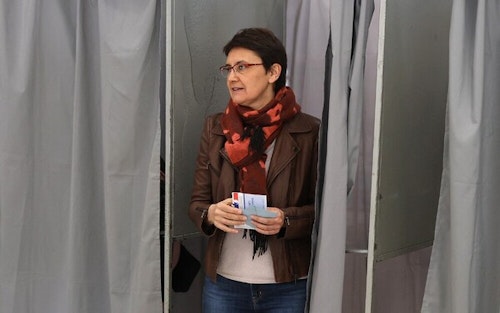
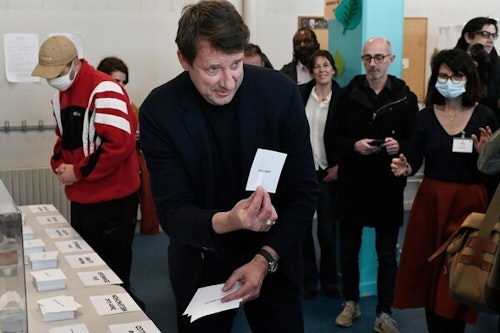
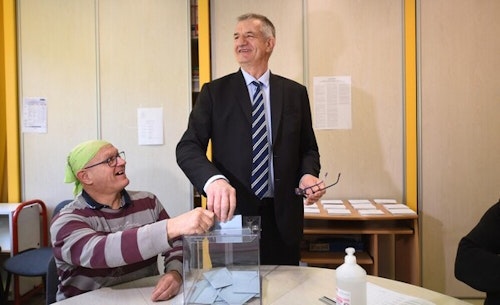
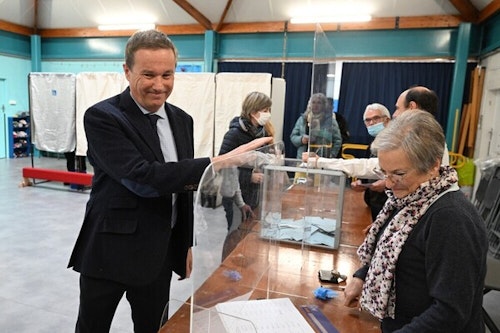
France's presidential candidates vote across the country
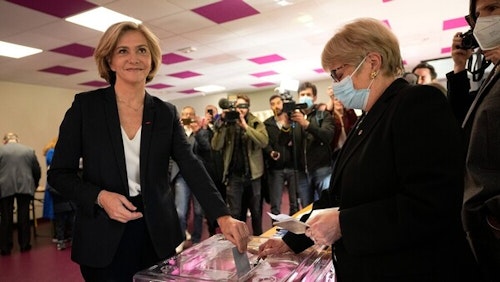
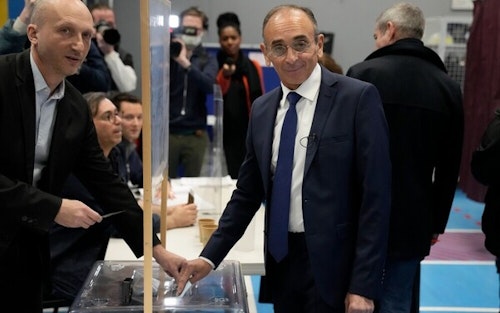
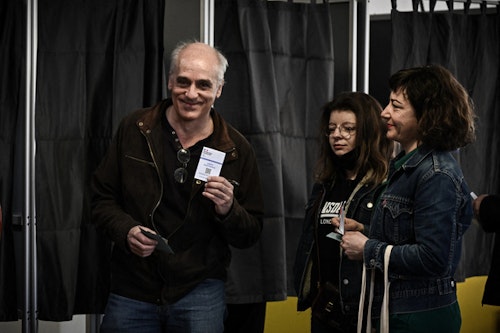
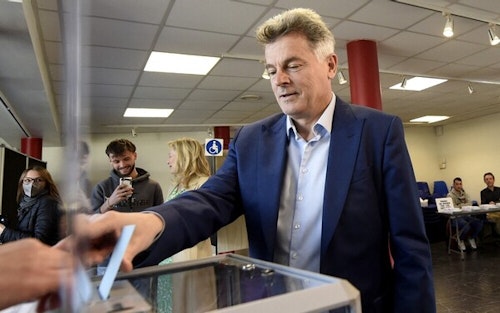
France's presidential candidates vote across the country
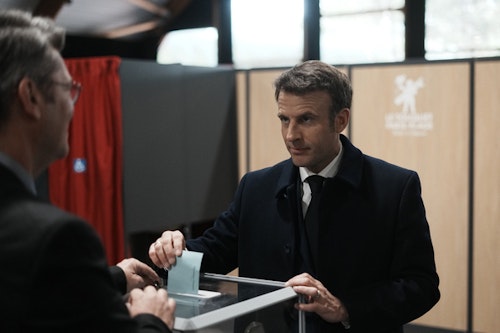
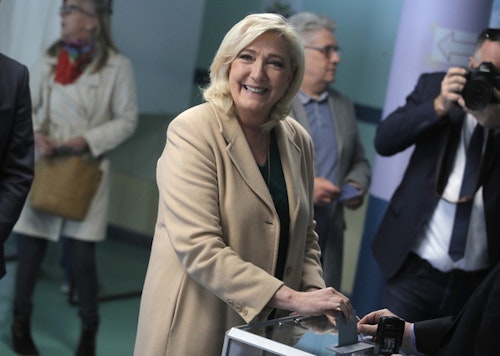
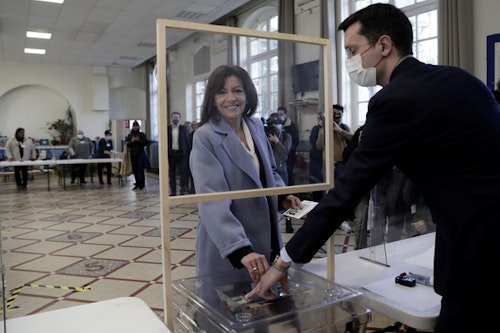
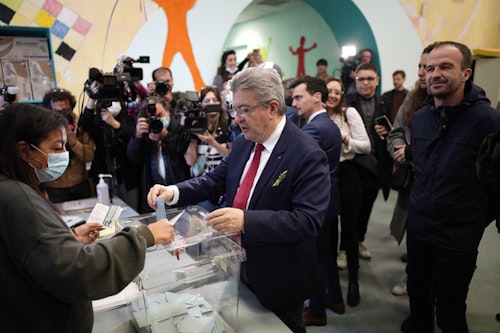
Take a look at our video explainer on France's presidential candidates and what they're proposing.
How powerful is France's president?
“We have a president in France who presides over the Republic, who controls the government, who controls parliament, who controls the Constitutional Court. It makes a super president," said Christophe Chabrot, a senior lecturer in public law at the Lumiere University Lyon 2.
This is in part due to the election by universal suffrage and the president's ability to appoint a prime minister to lead the government.
The timing of the two elections also reinforces the French president's power with the parliamentary election coming about a month later which assures that whoever wins the presidency will win a parliamentary majority.
“You don't change your political opinion in a month. So the election of the legislature will often give the same majority as that of the president,” Chabrot said.
Read more about France's presidency and 5th Republic here.
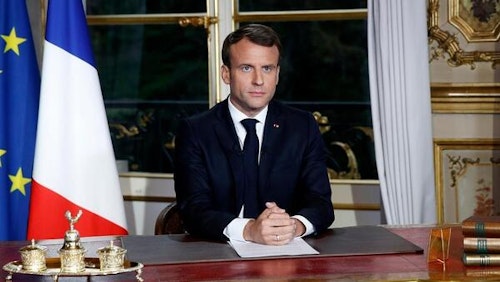
'People don't vote for a candidate. They vote against someone,' says Gaspard, who has decided not to vote in the election
Gaspard, a steeplejack currently working in Tignes, is one of the many young people who have decided not to vote in the election. He told Euronews he doesn't want to vote because people often vote against candidates instead of for them.
The 24-year-old says there aren't politicians who do manual labour and that they thus don't understand the situation of what poorer classes need. He thinks that many politicians have done the same studies and don't know what it's like to need to work every day to make a living.
He's also angry that politicians don't carry out their promises.

Turnout appeared to be lower this year than in 2017, according to the latest figures from France's interior ministry.
How does the French election work?
Each potential candidate in the election had to get 500 signatures from mayors or local politicians to support their bid for France's top job with France's constitutional council published a final list of candidates on 7 March.
The official campaign then began on 28 March, with French media, including Euronews, having to adhere to rules about giving equal airtime to each candidate.
The two candidates with the most votes in the first round of the election on 10 April will then go head-to-head in a second-round a fortnight later.
That's unless a first-round candidate obtains more than 50% of the vote share. No one has ever done this.
Read more about how the election works and why it's important here.
Turnout at 65% by 5:00 pm, less than what it was in 2017
Voter turnout was at 65% at 5:00 pm CET, nearly five points less than what it was in 2017.
In 2017, around 69.42% of voters had participated in the election by 5:00 pm while in 2012, the participation rate was at 70.59%.
France election: Who's who in the race to unseat Macron?
French voters go to the polls on 10 and 24 April to choose a new president - but who is in the running to unseat Emmanuel Macron?
Key issues dominating the campaign so far include work, the cost of living — a debate ignited by the 2018 "gilets jaunes" protests — the environment, immigration and security, especially after Russia invaded Ukraine at the end of February.
Here's a look at the 12 candidates running in the first round of the election.

Hello, I'm Lauren Chadwick, a reporter at Euronews, and I'll be covering the French elections live tonight until 2:00 am CET. Follow here for updates on the first round of the election as we learn which two candidates will make it to the next contest in two weeks.












